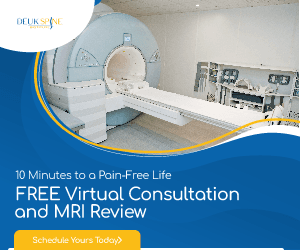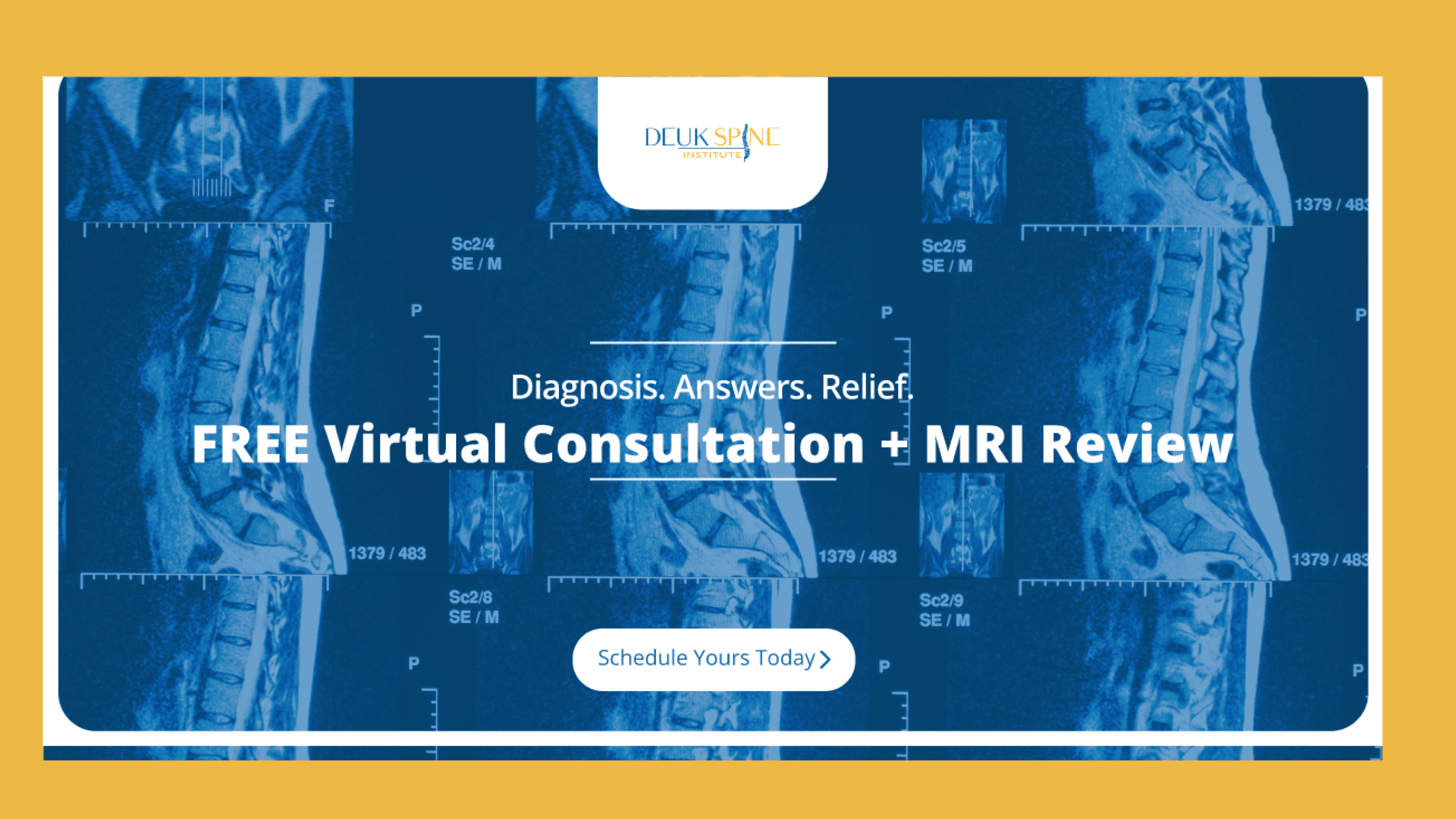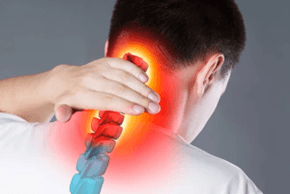
Chronic neck pain is one of the most common complaints among people in the US. Reports estimate that roughly up to 70% of adults experience some sort of neck pain that hinders their daily living activities during their lifetime. One of the most common causes of neck pain is arthritis.
You may be thinking to yourself that arthritis is usually found in knees, hips, and shoulders, but the cervical spine has tiny joints that can become arthritic and cause chronic neck pain, too.
What Is Arthritis in the Neck?
Arthritis of the cervical spine, also known as cervical spondylosis, is the swelling and tenderness of one or more joints in the neck.
A quick anatomy lesson: The cervical spine has facet joints at the top and bottom of each vertebra that allow for movement like bending, extending, and twisting of the neck. These facet joints often wear and degenerate due to arthritis. Facet joint degeneration leads to inflammation, resulting in stiffness and/or pain.
While age-related degeneration is one of the most common causes of arthritis in the neck, it can also be influenced by posture, genetics, and daily activities.
Common Symptoms of Arthritis in the Neck
Recognizing symptoms early is vital to getting ahead of arthritis. While pain is the most obvious sign, arthritis presents itself in several ways:
- Neck pain and stiffness: This is often worse in the morning or after periods of inactivity. You may feel a dull ache or a sharp sensation when turning your head.
- Reduced range of motion: You may find it difficult to look over your shoulder while driving or tilt your head toward your shoulder.
- Grinding or popping sounds (crepitus): As the cartilage wears away, you may hear or feel a grinding sensation when moving your neck. This is caused by bone-on-bone friction or rough joint surfaces rubbing together.
- Muscle spasms: When the joints are inflamed, the surrounding muscles often tighten up to "protect" the area, leading to painful spasms in the neck and shoulders.
- Cervicogenic headaches: Arthritis in the upper neck can refer pain into the head, typically starting at the base of the skull and radiating upward.
- Radiculopathy: If bone spurs form due to arthritis, they can press on nerves, causing numbness, tingling, or weakness radiating down the arm.

Treatment for Arthritis in the Neck
Although arthritis cannot be fully reversed, there are many effective treatments to manage the pain and improve the quality of life.
Physical therapy is a primary conservative measure. It does not involve surgery or harsh medications. A physical therapist will design a program to strengthen the neck and shoulder muscles (which takes the load off the joints), improve flexibility, and correct posture. While not a permanent "cure," it is essential for long-term maintenance.
Injections are a minimally invasive option for chronic pain. Common treatments include cervical facet joint injections or medial branch blocks. These deliver steroids and anesthetics directly to the inflamed joint. While not permanent, they can provide significant relief for weeks or months, allowing you to participate more fully in physical therapy.
Depending on the severity of symptoms, medication can help manage flare-ups.
- NSAIDS: Reduce pain and inflammation
- Muscle relaxants: Help stop painful muscle spasms
- Nerve pain medications: Help reduce nerve-related symptoms, usually in the upper extremities.
Medications often come with side effects. Always consult your doctor to weigh the pros and cons.
Lifestyle Changes and Ergonomics
Another treatment to help with neck pain is to change your lifestyle. These can be things like avoiding stressors, using more supportive pillows, and even practicing gentle stretching. Being consistent with lifestyle changes is key to seeing a difference in helping with chronic neck pain.
Surgery is typically considered the last resort for treating chronic neck pain. When conservative measures fail, or there are structural or nerve issues, surgery can become an option.
Unsure which treatment path is right for your specific condition? Get a professional evaluation of your MRI to understand your options.

Daily Tips to Help Alleviate Neck Pain
If you are struggling with chronic neck pain, incorporating these habits into your routine can help manage discomfort:
- Do gentle neck stretches: Start your day with slow neck rotations and "chin tucks" to warm up the stiff joints before regular activity.
- Avoid rapid head motions: Sudden jerking movements can aggravate inflamed facet joints. Move deliberately and scan with your eyes before turning your head.
- Practice "neutral spine" posture: Whether sitting at a desk or standing, keep your ears aligned with your shoulders. Avoid slouching or craning your neck forward.
- Stay hydrated: Intervertebral discs require water to remain spongy and shock-absorbing. Staying hydrated supports overall spinal health.
- Manage stress: Stress causes us to unconsciously shrug our shoulders and tighten our neck muscles. Mindfulness or breathing exercises can help lower this tension.
Advanced Treatments at the Deuk Spine Institute
While arthritis is a chronic condition, you do not have to live with debilitating pain. At Deuk Spine Institute, we specialize in state-of-the-art, minimally invasive solutions designed to target the root source of the pain.
When facet joints become arthritic, the inflammation triggers pain signals in the surrounding nerves. We can effectively eliminate that pain using Deuk Plasma Rhizotomy® (DPR).
How DPR works: Unlike traditional radiofrequency ablation, which uses heat that can damage surrounding tissue, DPR utilizes precise plasma energy. Through a tiny 4-millimeter incision, we are able to precisely ablate the sensitized nerve endings responsible for transmitting pain signals from the arthritic joints.
The Deuk Spine Institute Advantage:
Minimally invasive: The procedure is performed on an outpatient basis, meaning you return home the same day.
Opioid-free recovery: The procedure is so precise that it requires no post-operative narcotics.
FDA approved and safe: DPR is a proven, safe alternative to more aggressive surgical interventions.
Many patients believe their only surgical option for severe arthritis is a spinal fusion. Traditional fusion is highly invasive, permanently limits neck mobility, and often requires hospital stays and lengthy recovery times. The Deuk Plasma Rhizotomy offers a superior alternative: permanent relief from arthritic pain without the risks and limitations of joint fusion.
Patient Story
Learn how this patient's neck and facet pain were cured at the Deuk Spine Institute.
Make Your First Pain-Free Move
If you are seeking relief from neck pain, we can help improve your quality of life and enable you to live pain-free.
Upload your latest MRI for a free review and a personal consultation with myself, Ara Deukmedjian, M.D., founder of Deuk Spine Institute and creator of the Deuk Laser Disc Repair® procedure.
Watch Deuk Laser Disc Repair® in Action
Our goal is to be completely transparent about our process and procedures for treating neck issues. We livestream surgeries with our patients’ written consent, allowing you to observe our technique.
See How it Works
Watch a recent Deuk Plasma Rhizotomy.
FAQs
Q: Can arthritis in the neck be cured?
A: While there's no cure for neck arthritis, symptoms can be effectively managed through various treatments, including physical therapy, medication, lifestyle modifications, and in severe cases, surgery.
Q: How long does it take for neck arthritis to heal?
A: Neck arthritis is a chronic, progressive condition that doesn't "heal," but symptoms often improve within 6-12 weeks with proper treatment. Ongoing management helps control pain and maintain function long-term.
Q: Can neck arthritis cause arm pain and numbness?
A: Yes, if bone spurs or inflammation compress nerve roots, you may experience radiating pain, numbness, tingling, or weakness in your shoulders, arms, or hands—a condition requiring medical evaluation.

